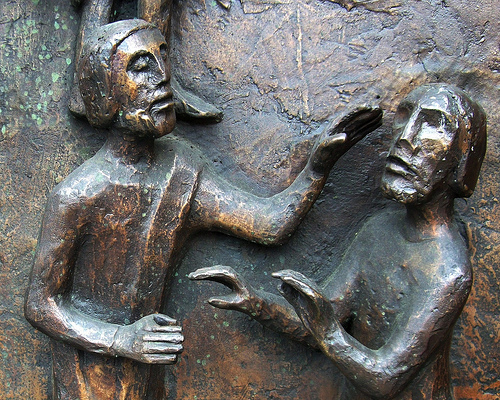We run our website the way we wished the whole internet worked: we provide high quality original content with no ads. We are funded solely by your direct support. Please consider supporting this project.

Why Doesn’t God Heal When We Ask?
If we are called to manifest what Jesus manifested and revolt against what Jesus revolted against, and Jesus carried out the kingdom through healing, then why doesn’t God heal those we pray for?
One of my personal kingdom heroes is a Vietnamese lady named Dr. Huyen Tranberg. She is a medical doctor who works with Vietnamese refugees living along the Mekong River in Cambodia.
Several years ago I went to Cambodia on a medical missions team. There I came to deeply love a nine-year-old disabled girl named Mai. This child had a personality and a smile that could light up a room. Her demeanor was all the more beautiful given her tragic circumstances. If there’s one thing worse than being an impoverished refugee in a third world country, it’s being a disabled child refugee in a third world country. Mai’s legs simply did not work.
I encountered Mai several times over the next 10 days. Her family belongs to the church that functioned as our base. She spoke no English, and I spoke no Vietnamese, but somehow we managed to connect. Much of our interaction centered on teaching each other words for various things and then laughing at how badly we mispronounced each other’s language.
The day before our team returned home Mai gave me a note. Dr. Tranberg translated the note for us. Mai wanted us to take her home with us. “I know the doctors in America can make my legs work,” she wrote. “I want to be able to play like other kids and not have to get pushed around anymore. Please.” Since Mai was an illegal refugee and had no documentation whatsoever, we were told that getting her to the States would be impossible. And in this case Dr. Tranberg told us that Mai’s condition was such that there was nothing any doctor in any country could do for her.
So we gathered around Mai and prayed. I mean, we prayed! I don’t recall ever being as passionate about a prayer for healing in my life. We bombarded heaven with our cries. How I wish I could write that Mai suddenly had her legs stored. I would trade in the use of my own legs in a heartbeat if I could give this testimony. But I can’t. When we ended our prayers Mai’s legs were just as they had been.
Why wasn’t Mai healed? I hope it’s obvious that this is much more than an academic question for me. I never before laid my heart and faith on the line for healing like I did for this precious child, and something came close to dying in me when it didn’t happen. For a period of time afterwards, I felt it hard to passionately pray for anyone’s healing. It’s always easier to abandon hope than to be continually disappointed.
Now, I know there are some who would claim that Mai wasn’t healed because I and the others who prayed for her lacked faith. If we “really” believed, they say, Mai would have been healed. Others, of course, would say that it simply wasn’t God’s will for Mai to be healed. I don’t buy either explanation.
While the New Testament indicates that God at times withholds healing for a higher purpose, the uniform pattern of Jesus’s ministry in the early church reveals God’s ideal is to free people of their infirmities. And while the Gospels reveal that faith is an important variable in determining whether someone gets healed or not, it never turns this into a magical formula by making it the only variable. Indeed the New Testament provides examples of people being healed and delivered in which faith seemingly played little or no role (Mark 5:41–42).
So, if we can’t explain Mai’s lack of healing on the basis of God’s will or lack of faith, then what explains it?
And now for my great theological revelation: I have no clue.
In fact, I’m quite certain the question simply is unanswerable for any finite human being. But it’s unanswerable not because God’s will is so mysterious, for God’s will was clearly revealed in Jesus Christ. God is against everything that is a byproduct of Satan’s oppressive regime, including sickness and disease. The question is unanswerable because the world is, for our finite human understanding, unfathomably complex. It would take literally limitless knowledge of world history to be able to explain these sorts of things, and only the omniscient one, God himself, is capable of this.
Follow me here. Behind any given event lies a line of influences that extends back to the beginning of time. Had any of these influences been slightly different, any given event might have occurred differently. To illustrate: right now it’s 10:59 AM on Friday. I just heard a car rush by (way over the speed limit) on the street beneath my window. So let’s ask, why did I hear a car rush by my window just now?
The simple explanation, of course, is that I happened to be sitting in my room writing, while (let’s suppose) a guy named John who lives down the street happened to be rushing to the local pharmacy to get some Advil to relieve his terrible headache. But this really isn’t much of an explanation, is it? For the phrase “happened to” conceals a virtual infinitude of complexity.
Think for a moment on all the decisions I made today and every day leading up to this one that influenced my decision to be writing in my room right now. Think also of all the decisions other people made every day leading up to this one that affected each of my decisions throughout my life that resulted in my “happening to” be writing in my room right now. Had any of these decisions been different, I might very well not be sitting here writing.
The same is true of John. Had he not had too much to drink the night before, he wouldn’t have woken with a terrible headache and wouldn’t be speeding to the pharmacy right now.
Now add to this complexity the innumerable decisions made by nonhuman agents throughout history that have influenced human decisions, and you begin to see that there is a virtual infinite and unfathomably complex web of influences that go into explaining why I happened to hear a car race past my window on this day. Had any of these decisions been different, this event might not have taken place.
And for the exact same reason, we can’t ever fully explain why anything happens the way it does. I therefore can’t explain why Mai wasn’t healed for the same reason I can’t explain why I heard the car race past my window. For the same reason, I don’t have to blame God or anyone’s lack of faith for the fact that Mai wasn’t healed.
I’ve learned that many people refrain from passionately revolting against infirmities because they anticipate feeling awkward that the person isn’t healed. Behind this awkwardness lies a formulaic theology that sees God’s will or human faith as the only two variables affecting prayer. And it’s hard to tell a little girl like Mai that it either wasn’t God’s will to heal her, or that it was God’s will but she or those praying for her lack faith.
It’s time we free ourselves from this formulaic theology and simply accept that we don’t know why one person is healed while another is not. Yet, even as we confess our massive ignorance about why things happen the way they do, we must hold fast to what we do know. We know that God’s will and character is perfectly revealed in Jesus Christ, and Jesus Christ always revolted against infirmities. Since our job is to imitate Jesus in all things, we must assume it’s our job to revolt against infirmities as well.
Image by sea turtle via Flickr
Category: Q&A
Tags: Faith, Sickness, Spiritual Warfare, Warfare Worldview, healing
Topics: Faith & Doubt, The Problem of Evil
Related Reading

The Warfare Worldview: What Would You Tell the Younger You?
Aftab Uzzaman via Compfight Jessica Kelley has been fleshing out the Warfare Worldview on her blog in a series of posts using the lens of the death of her child, Henry. Jessica is a beautiful writer, and her reflections are powerful and tender. You’re going to want to be listening to her. Her voice is an…

When Free Will Meets Unfathomable Evil
In the face of tragedy Christians unfortunately tend to recite clichés that attempt to reassure people that, however terrible things seem, everything is unfolding according to God’s mysterious plan. We hear that “God has his reasons”; “God’s ways are not our ways”; “God is still on his throne”; “God doesn’t make mistakes,” and things of…

Why Bart Ehrman Doesn’t Have to Ruin Your Christmas (Or Your Faith) Part 3
This is the third of several videos Greg put together to refute Bart Ehrman’s claims published in the article What Do We Really Know About Jesus? If you missed the first two installments you can find them here and here.

Sermon: God Needs Prayer
In this sermon clip, Greg Boyd discusses some of the challenges we face when praying. The full sermon wrestles with questions like: If God is all-powerful, does he need our prayers to change this world? And is it even worth praying if we can’t see the results? Greg addresses these questions as he begins a…

In the Wilderness of Religion
Eric Bryan via Compfight There are an awful lot of us in the Church today who are no longer feeling at home in Evangelicalism. Regardless of how you feel about World Vision’s hiring policy decisions, the spectacle of thousands of people discontinuing their child sponsorships (relationships with flesh and blood children in need) because of…

Have You Taken a Gospel Immunization Shot?
Why does being “Christian” in America make so little difference in so many people’s lives, when the kingdom movement revealed in the New Testament revolutionized people’s lives? This drastic difference is hardly surprising when you consider that the gospel that people are often given today is little more than a contract of acquittal that is…
